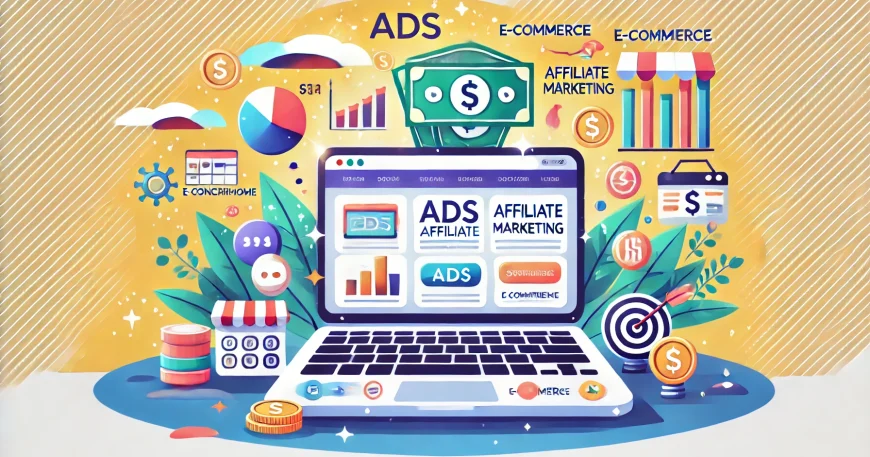Turning your website into a revenue-generating asset can be both exciting and overwhelming, especially if you’re just starting. Whether you run a blog, operate an informational platform, or manage an e-commerce site, website monetization opens up opportunities to generate passive income, scale your business, and increase your bottom line.
This guide is designed to walk you through the fundamentals of monetizing your website, from exploring potential strategies to conquering common challenges. By the end, you’ll have a solid grasp of how to transform your website into a sustainable and profitable platform.
Understanding Your Website’s Value
The first step in website monetization is understanding the potential your site holds. Here’s how to assess your website’s current position and identify growth opportunities.
Assessing Your Website’s Current State
Start by evaluating the following metrics for your website:
- Traffic: How many visitors do you attract daily, weekly, and monthly? Websites with consistent, high traffic often benefit more from ads or other monetization strategies.
- Audience Demographics: Who visits your site? Understanding age, location, interests, and purchasing habits is critical for choosing the right monetization strategies.
- Content Quality: Is your content engaging, relevant, and shareable? A quality content strategy increases visitor retention and enhances your ability to monetize.
Identifying Monetization Potential
Different websites have different revenue-earning potential. For example:
- Blogs with niche audiences often thrive with affiliate marketing.
- E-commerce platforms succeed by offering upsell opportunities.
- Informational websites benefit from display ad revenue.
Various Monetization Strategies
Once you’ve assessed your website’s value, explore the available monetization strategies that best suit your site’s structure and goals.
Advertising
Advertising is one of the most common methods to monetize a website. Here are key approaches:
- Display Ads
Platforms like Google AdSense allow you to display banner ads on your site. These pay you based on impressions or clicks.
- Native Ads
Native advertising, such as “sponsored posts,” blends seamlessly with your content and is less intrusive for users.
- Affiliate Marketing
Through programs like Amazon Associates, you earn a commission by promoting and selling third-party products on your website.
Selling Products
If you’re open to becoming an online seller, consider these options:
- E-Commerce Platforms
Set up a store with platforms like Shopify to sell physical goods directly to your audience.
- Digital Products
Sell eBooks, tutorials, or templates related to your expertise for added revenue.
Subscription Models
If your website offers premium insights or unique content, implementing subscription models may be the way to go.
- Membership Sites
Charge users to access exclusive forums, videos, or other premium resources.
- Paywalled Content
Limit specific content to paying users for added income streams.
Factors to Consider Before Monetizing
Jumping into website monetization without preparation can lead to pitfalls. Keep these factors in mind to ensure sustainable growth.
Target Audience Analysis
Understanding your audience’s preferences, purchasing habits, and pain points ensures your monetization efforts align with their interests.
Competitive Landscape Research
Analyze how your peers—especially successful competitors—are monetizing their websites. This can reveal tested strategies and inspire unique ideas.
Legal and Ethical Considerations
Compliance is essential to maintain trust and meet regulations (such as GDPR). Avoid intrusive ad placements or unethical practices that can harm user experience.
Implementing Monetization Strategies
With a plan in place, it’s time to implement the right ways to create revenue through your site.
Choosing the Right Strategy
Identify the ideal monetization strategy based on your website’s niche, audience behavior, and goals. For example:
- High-traffic sites might prioritize display ads.
- Niche blogs might thrive with affiliate marketing.
Setting Up the Necessary Infrastructure
Secure user-friendly tools to support your strategy:
- For Ads: Set up Google AdSense or Mediavine.
- For Subscriptions: Integrate membership plugins like MemberPress or WooCommerce.
- For E-Commerce: Use Shopify or WooCommerce for seamless sales management.
Enhance User Experience
Avoid overly aggressive tactics like excessive pop-ups. Instead, keep the user experience easy, enjoyable, and friction-free.
Measuring Success
You can’t improve what you don’t measure. Here’s how to track the effectiveness of your monetization strategies.
Key Performance Indicators (KPIs)
Important KPIs include:
- Click-Through Rates (CTR) for ads.
- Conversion Rates for e-commerce or affiliate links.
- Membership Signups for subscription models.
Using Analytics Tools
Leverage tools like Google Analytics to monitor user behavior, traffic, bounce rates, and more. Apply these insights to fine-tune your strategy over time.
Common Challenges and How to Overcome Them
Dealing with Ad Blockers
Ad blockers can reduce your revenue potential. To combat this:
- Use non-intrusive ads to avoid triggering blockers.
- Offer ad-free experiences in exchange for a subscription fee.
User Engagement
Overloading pages with ads or promotions can drive visitors away. Focus on providing value through great content to keep your audience engaged.
Balancing Monetization with Content Quality
Find a sweet spot. Over-monetization can harm content quality and deter visitors. If you sell products, ensure your website doesn’t turn into an endless sales pitch.
Future Trends in Website Monetization
AI and Automation
AI-driven personalization will be a game-changer for more targeted offers, whether in advertising or selling digital products.
Interactive Experiences
Websites that offer interactive elements, like quizzes or custom recommendations, may see higher conversion rates.
Microtransactions
With digital content like ebooks or how-to videos becoming popular, microtransactions allow users to pay for content in small increments, creating a new revenue stream.
Take the First Step Towards Website Monetization
Website monetization is more than just a way to earn extra income—it’s a strategy to amplify the value of the hard work you’ve put into your platform. By leveraging the right techniques, keeping user experience in mind, and tracking your progress, you’ll be well on your way to turning your website into a powerful revenue generator.
What are you waiting for? Start implementing these strategies today! And if you have questions about getting started, feel free to share them in the comments below—our team is here to help.
For more important and useful information click here.





